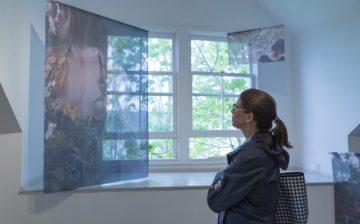Master of Fine Arts
Revised: October 2019
Admissions Advice
Transferring Credit Policy
Application
Deadlines & Notification
Applications are accepted for consideration at any time, however the deadline for application submissions for fall retreat admissions is September 30 and for spring retreat admissions the deadline is April 15. Admissions materials are reviewed by the core MFA faculty and acceptance decisions are made prior to retreats.
Applicants are notified of admissions decisions within three weeks of receipt of completed applications.
Submission Guidelines
Transcripts and letters of recommendation should be sent to:
MFA Admissions
Maine Media College
70 Camden Street
Rockport, Maine 04856
All other materials should be submitted via one of the following options:
- Website gallery (in the case of a password protected gallery, please provide the password).
- Vimeo page (please provide password if necessary).
- USB flash drive mailed to the above address.
Images for digital portfolios should be JPG files and not exceed 1200 pixels in any dimension.
Interview
A member of the MFA Committee may, in the interest of making informed decisions, contact an applicant upon receipt of the application materials to schedule a telephone interview.
The Retreat
Students accepted to the program who choose to attend the retreat will present work for critique and participate fully in all retreat activities. Students should be prepared to discuss their work, describe artistic goals and provide historical and cultural context for their work during critiques at the retreat.
Auditing
A prospective applicant may audit a retreat as an opportunity to experience this aspect of the program without making a commitment to apply.
Special Considerations for Applicants without an Undergraduate Degree
An undergraduate degree is a generally accepted indicator that the holder has acquired knowledge and has developed skills in the arts and sciences, including the capacity for critical thought and the ability to synthesize ideas and practice in ways adaptable to environments and circumstances outside of the undergraduate program, whether these involve professional work or higher levels of education. Applicants without an undergraduate degree must demonstrate by other objective measures, to the satisfaction of the MFA Committee, that they have acquired commensurate knowledge and skills. For those with some college experience, the Committee will further evaluate transcripts and coursework including syllabi, when available and desired) in an effort to better assess specific knowledge and competencies applicants have acquired in the course of their studies as well as the extent to which these intersect with the goals of the MFA.
- The Committee requires that, in its majority judgment, the creative work submitted by applicants will be superior in both clarity of artistic statement and technical proficiency. The Committee may seek support for its judgment in this area through close examination of applicants’ resumes (awards, grants, work/life experience, etc.).
- The Committee may require, especially when there is insufficient other information on which to base an assessment about the applicant’s ability to analyze, evaluate and make judgments about works of art, that the applicant submits an additional 500-word essay so demonstrating.
Because of the specialized nature of the training offered, transfer in credits are not accepted. The school does not guarantee the transferability of credits to another school, college, or university. Credits/clock hours or coursework are not transferable; any decision on the comparability, appropriateness and applicability of credit and whether credit should be accepted is the decision of the receiving institution.
It is the policy of Maine Media College to not discriminate any individual in the United States on the basis of race, color, religion, sex, national origin, age, sexual orientation, disability, political affiliation or belief, and against beneficiaries on the basis of either citizenship/status as a lawfully admitted immigrant authorized to work in the United States.
International Students
Proficiency in spoken and written English is critical to students’ success in the MFA program at Maine Media College. Applicants whose first language is not English are required to submit TOEFL scores. International students who have previously earned an undergraduate or graduate degree from a college or university at which instruction is provided in English are exempted from this requirement. TOEFL test scores must be reported directly to Maine Media College through Educational Testing Service (ETS). The ETS institutional code for Maine Media College is B686. For more information about ETS and TOEFL scores please contact the registrar at [email protected].
There are no minimum-score requirements for admission. Test results are considered in light of other factors used to determine preparedness for graduate study.
Americans with Disabilities Act of 1990
The school complies with the Americans with Disabilities Act of 1990 and is wheelchair accessible. If enrolled under training with a government agency, institution district, and/or other entity, students must meet the admission requirements set out in the training agreement and/or applicable state licensing or certifications requirements.
Facilities/ Services for Student with Disabilities
While accessibility may come from individualized accommodations, Maine Media should be an already accessible environment, both physically and intellectually. In accordance with the Americans with Disabilities Act of 1990 and its amendments and Section 504 of the 1973 Rehabilitation Act, Maine Media provides reasonable accommodations to all students with documented disabilities.
See Maine Media’s complete information about Accessible Learning here.
Note: In order to be eligible for Title IV, HEA funding, you must be able to benefit from the reasonable accommodations.
Incarcerated Applicants
A student is considered to be incarcerated if she/he is serving a criminal sentence in a federal, state, or local penitentiary, prison, jail, reformatory, work farm, or similar correctional institution (whether it is operated by the government or a contractor). A student is not considered to be incarcerated if she/he is in a halfway house or home detention or is sentenced to serve only weekends. Our attendance policy specifies that all classes and practical studies require attendance at the school’s physical location; therefore, incarcerated students are not eligible for admissions.
Conviction for possession or sale of illegal drugs
- A Federal or state drug conviction can disqualify a student for FSA funds. The student self-certifies in applying for aid that he/she is eligible for by using the FAFSA. Maine Media College is not required to confirm this unless there is evidence of conflicting information.
- The chart below illustrates the period of ineligibility for FSA funds, depending on whether the conviction was for sale or possession and whether the student had previous offenses. (A conviction for the sale of drugs includes conviction for conspiring to sell drugs)
| Possession of illegal drugs | Sale of illegal drug | |
| 1st Offense | 1 year from date of conviction | 2 year from date of conviction |
| 2nd Offense | 2 year from date of conviction | Indefinite period |
| 3+ Offense | Indefinite period |
- If a student was convicted of both possessing and selling illegal drugs, and the periods of ineligibility are different the student will be ineligible for the longer period.
- A student regains eligibility the day after the period of ineligibility ends or when he/she successfully completes a qualified drug rehabilitation program. Further drug conviction will make him/her ineligible again.
- When a student regains eligibility during the award year, the college may award Pell and/or Loan for the current payment period.
- A qualified drug rehabilitation program must include at least two unannounced drug tests and must satisfy at least one of the following requirements.
- Be qualified to receive funds directly or indirectly from a federal, state or local government program.
- Be qualified to receive payment directly or indirectly from a federally or state-licensed insurance company.
- Be administered or recognized by federal, state or local government agency or court.
- Be administered or recognized by a federally or state-licensed hospital, health clinic or medical doctor.
Upon receipt of all required documents and in good order, the prospective student is eligible to enroll in the school. When all admissions criteria and requirements are met, the prospective student is given the date of the next class. The first day of class will include financial aid and academic orientation, in which the students will sign their enrollment contract, student permit form and additional required paperwork.




